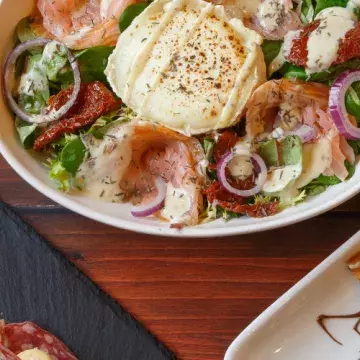Part 1
France is known all over the world for its food and drink, and there’s no doubt that many visitors to the country are keen to get a first-hand taste of the best of French cuisine. But when it comes down to it, how many of our stereotypes about the French relationship to food and drink still stand up to scrutiny, and how many are outdated, exaggerated or just plain untrue?
Let’s tuck into some of the most-common myths about French food and see if we can separate the half-baked stereotypes from the truth.
Myth Number 1: The 'pain au chocolat'
It’s no surprise that this buttery French pastry is such an international star and that it has made its way from the boulangeries of France to the bakery section of every UK supermarket and café.
The beautiful multi-layered texture of a croissant laced with strips of melting dark chocolate. What’s not to love?
However, this little pastry is more controversial than it might seem at first glance.
You may not be aware that a fierce debate divides France when it comes to the correct name for this delicacy. Chances are you probably know it as a ‘pain au chocolat’, however in a large portion of South West of the country (stretching roughly from Charente-Maritime all the way down the west coast and over to Toulouse) this pastry is proudly referred to a ‘chocolatine’.
That’s why, if you’re staying at one of our South West holiday parks, such as La Réserve or Les Viviers, you might get some funny looks when you try and order a ‘pain au chocolat’ for your breakfast. Of course, people will understand what you mean, however if you do make the effort to use the local term, the boulanger’s heart is likely to become as warm and gooey as the melted chocolate inside one of their freshly baked ‘chocolatines’.
One of our Siblu colleagues, born and bred in the South West, provided the following quote when asked to discuss the pain au chocolatine debate (we will keep her anonymous to protect against retaliation from angry Parisians):
'There is no debate! As its name suggests ‘pain au chocolate’ refers to a piece of bread with a square of chocolate, the kind of thing that children used to eat for an afternoon snack. On the other hand ‘chocolatine’ refers to that delicious, golden, oven-baked pastry which can be eaten at any hour of the day.'
So, which is the correct way of saying it?
Who knows… But if you want to fit in with the locals, you will probably want to ask for a 'chocolatine' when you’re staying at: La Réserve, Les Viviers, Les Dunes de Contis, and Le Domaine de Soulac
Myth Number 2: French children grow up drinking wine
France is famous for fine wines, so perhaps it is not surprising perhaps that we imagine French children to be trained in appreciating this part of the culture from a young age.
Reports have even claimed that this might have positive effects on the general drinking culture and that that enjoying small tastes of wine at the dinner table in a family setting, may reduce rates of binge-drinking later in life.
However, despite this stereotype, the minimum age for buying alcoholic drinks in France is 18 years old, just as it is in the UK!
Nevertheless, the idea that the French learn to handle their alcohol at a young age may well have its origins in historical truth. As in many countries, in the days when clean drinking water was harder to come by, slightly alcoholic drinks were often considered to be a more sterilised and therefore 'healthier' option, and were commonly given to children as well as adults.
It may seem bizarre, but state-provided school dinners in France only stopped including wine for the under 14s in the 1950s, and alcohol was still allowed at school for over 14s until as late as the 1980s! It is no surprise then that British exchange students during this time probably returned home with exotic tales of boozy school dinners quite unthinkable in UK schools.
However, rest assured that nowadays, although parents might sometimes give their children a taste from their glass while they are growing up, the thought of wine in at school dinners is just as surprising and outdated in France as it is in the UK.
Myth number 3: The French drink their coffee from bowls
This myth does have some truth to it, but drinking coffee, tea or hot chocolate from a bowl tends to be something that only happens at breakfast time in France. Who knows where this tradition started… maybe because it’s easier to dip bread or patisseries into a bowl? Or maybe there’s something satisfying about holding a bowl with two hands to savour the first hot drink of the day?
However, don’t worry if you’re not feeling ready to start slurping your coffee or tea from a bowl; it is probably not something you will encounter when ordering a hot drink when out and about. You are much more likely to receive your coffee in an espresso cup at any café.
